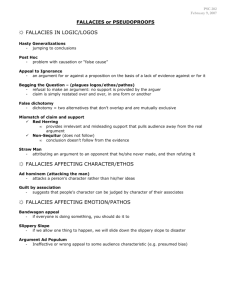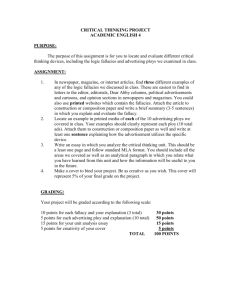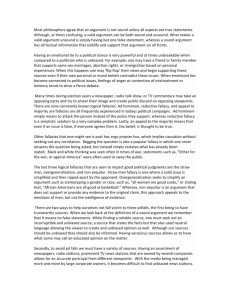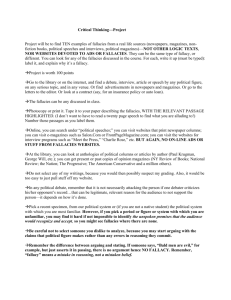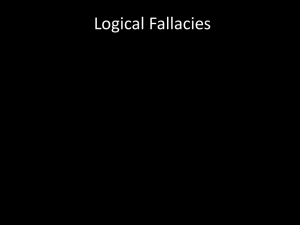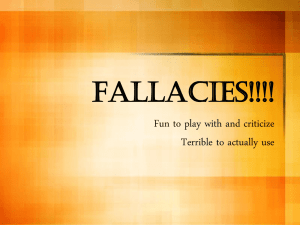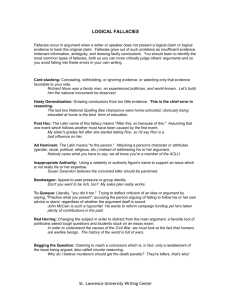Fallacies:
advertisement
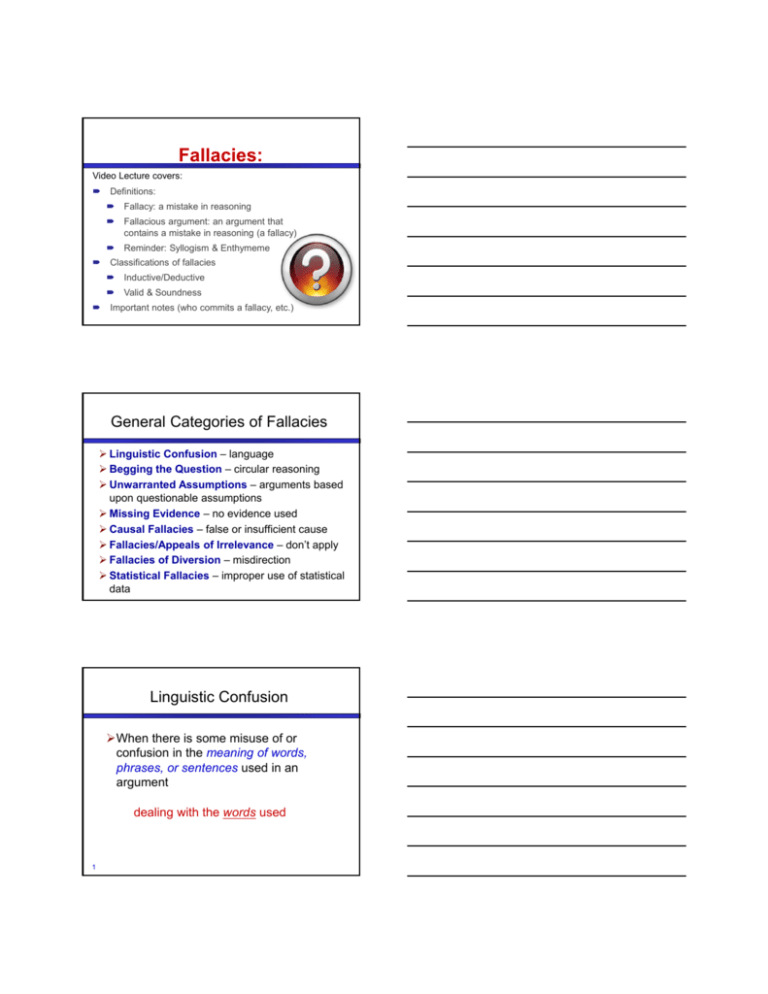
Fallacies: Video Lecture covers: Definitions: Fallacy: a mistake in reasoning Fallacious argument: an argument that contains a mistake in reasoning (a fallacy) Reminder: Syllogism & Enthymeme Classifications of fallacies Inductive/Deductive Valid & Soundness Important notes (who commits a fallacy, etc.) General Categories of Fallacies Linguistic Confusion – language Begging the Question – circular reasoning Unwarranted Assumptions – arguments based upon questionable assumptions Missing Evidence – no evidence used Causal Fallacies – false or insufficient cause Fallacies/Appeals of Irrelevance – don’t apply Fallacies of Diversion – misdirection Statistical Fallacies – improper use of statistical data Linguistic Confusion When there is some misuse of or confusion in the meaning of words, phrases, or sentences used in an argument dealing with the words used 1 Linguistic Confusion Fallacies Equivocation - directing an opponent toward an unwarranted conclusion by making a word or phrase, employed in two different senses in an argument, appear to have the same meaning throughout. (To “equivocate” is to make it appear that two words have the same meaning when, in fact, they do not.) Ambiguity Semantical Ambiguity - presenting a claim or argument that uses the same word or phrase that can be easily interpreted in two or more different ways, without making it clear which meaning is intended. Syntactical Ambiguity - due to poor grammatical construction, which allows for the question/statement/ argument to be taken in two or more different ways. False Ambiguity - carelessly interpreting a word or phrase in a manner not justified by the context. (Taking something too literally--entirely the listener’s fault.) continued... Linguistic Confusion Fallacies Distinction Without a Difference – trying to say something is different when it isn’t necessarily so. Emotionally Loaded Language – - manipulating the connotative meaning of words to establish a claim without proof. Technical Jargon – using technical terms not immediately understood by audiences (intentionally or unintentionally) Hyperbole – deliberate exaggerations to create emphasis or effect (okay as a literary device, such as in poetry, but not okay in an argument) Begging-the-Question Fallacies An argument that uses its conclusion as part of the evidence in support of that very same conclusion. We should do X. Why? Because X is what we should do. 2 Begging-the-Question Fallacies Circular Reasoning – either explicitly or implicitly asserting in one of the premises of an argument what is asserted in the conclusion of that argument. Loaded or Complex Question - formulating a question in such a way that a definite answer has already been given to some other (unasked) question. Leading Question - planting a proposed answer to a question at issue by the manner in which the question is asked. Unwarranted Assumptions Fallacies Arguments based upon questionable, although sometimes popular, principles or assumptions. Evidence/ Assumption Conclusion If this is questionable... …How likely is this to be true? 3 Unwarranted Assumption Fallacies Fallacy of the Continuum - assumes that small differences are always unimportant, or that supposed contraries (as long as they are connected by intermediate small differences) are really very much the same. Failing to recognize the importance or necessity of sometimes making what might appear to be arbitrary cut off points. “One more straw won’t break the camel’s back.” Transfer Fallacies - XY assumes that properties X of one “transfer” to the other. Fallacy of Composition Y - assumes that, because a property is affirmed or denied of the parts of some whole, that same property may also be affirmed or denied of the whole. (Completely inductive reasoning) Fallacy of Division - assumes that, because a property is affirmed or denied of some whole, that same property may also be affirmed or denied of any of the parts of that whole. (Completely deductive reasoning) continued... Unwarranted Assumption Fallacies False Alternatives (False Dilemma, False Dichotomy, Either/Or) – assuming too few alternatives and, at the same time, assuming that one of the suggested alternatives must be true. Is/Ought Fallacy – assumes that because something is the case, it ought to be the case. Likewise, assumes that because something is not the case, it ought not be. Wishful Thinking – assumes that because you want (wish) something to be the case, it is or will be the case. Conversely, it assumes that because you don’t want something to be the case, it is or will not be the case. continued... Unwarranted Assumption Fallacies Misuse of a Generalization (Hasty Generalization) - assumes that a generalization or principle has no exceptions, and thus misapplies it in a particular situation. Conversely, it attempts to refute a generalization by means of exceptional cases. Faulty Analogy (False Analogy) - assumes that because two things are alike in one or more respects, they are necessarily alike in some other respect. (Comparing apples to oranges) = Fallacy of Novelty - assumes and argues that a new idea, new law, new policy, or new action is good simply because it is “new.” Fallacy of Incomplete Comparison - implies a comparison where no standard for comparison is given. Fallacies of Missing Evidence When no evidence at all (or only the appearance of evidence) is used in reasoning. Evidence/ Assumption If this is nonexistent... Conclusion …How likely is this to be true? Fallacies of Missing Evidence Fallacy of Negative Proof (Appeal to Ignorance) – assumes that a claim is true simply because it has not been proven false. Moreover, it assumes that a claim is true because of the inability or refusal of an arguer to present convincing evidence against it. Conversely, it assumes that a claim is false because of the inability or the refusal of an arguer to present convincing evidence for it. (AKA: ad ignoratium) Contrary-to-Fact Hypothesis - a poorly supported claim about what might have happened in the past if other conditions had been present, or about an event that might occur in the future. Unsuitable Use of a Cliché - using a cliché in place of relevant evidence for a claim. Neglect of Relevant Evidence - arguing in a way that ignores, suppresses, or unfairly minimizes the importance of obvious evidence unfavorable to one’s position. Causal Fallacies (False Cause) Faulty reasoning about the causal relationships between events. Cause Effect Post hoc ergo propter hoc (post hoc fallacy) “after this, therefore because of this.” Causal Fallacies (False Cause) Confusion of a Necessary with a Sufficient Cause - assumes that a necessary condition of an event is also sufficient one. Causal Oversimplification - oversimplifying the relevant antecedents of an event or series of events. (Definition of antecedent: anything prior to something) Neglect of a Common Cause – Effect fails to recognize that two seemingly related events Cause may not be causally related at all, but rather effects of a common cause. Domino Fallacy (Slippery Slope) - assumes without appropriate evidence, that a particular action or event is just one (usually the first) in a series of steps that will inevitably lead to some specific consequence. Effect Fallacies/Appeals of Irrelevance Employing premises that are logically irrelevant to their conclusions (non sequiturs or argumentative leaps). Can also be an appeal to emotions, used as a substitute for evidence. non sequitur – 1. a conclusion or inference that does not follow from the premises 2. a remark having no bearing on what has just been said. Fallacies/Appeals of Irrelevance Attacking the Person (Ad Hominem) Abusive Ad Hominem - attacking one’s opponent in a personal and abusive way, rather than responding to the claim of the argument. (“ad hominem” is Latin for “the man”) Tu Quoque Argument - responding to an attack on one’s actions or ideas by accusing one’s critic of thinking or adding in a similar way (“tu quoque” means “you also,” “look who’s talking” or in a way that is equally hard to defend. (attacks a “do as I say, not as I do” argument.) Poisoning the Well - rejecting a claim defended by another because of that person’s special circumstances or improper motives, or because of a negative evaluation of that person. (Discrediting the source so that it precludes any consideration of the evidence/argument.) Genetic Fallacy - evaluating a thing/idea in terms of its earlier context, and then carrying that evaluation over to that thing/idea in the present. continued... Fallacies/Appeals of Irrelevance Irrelevant or Questionable Authority - attempting to support a claim by quoting the judgment of one who is not an authority in the field, the judgment of an unidentified authority, or the judgment of an authority who is likely to be significantly biased in some way. Appeal to Tradition - attempting to persuade others of one’s point of view by appealing to their feelings or reverence or respect for some tradition that supports that view, rather than presenting appropriate evidence or reasoning. Missing the Point - drawing a conclusion that purports to follow from the evidence which misses the point of the evidence; or presenting evidence that does not support a stated conclusion. Ad Miseracordiam (Special Pleading) - appeal to pity or misery Irrelevant Appeals Appeal to Public Opinion (Bandwagon Philosophy/Appeal to the People) - urging the acceptance of a position simply on the grounds that most (or at least great numbers of) people accept it. (Go ahead, jump on the bandwagon.) Fallacies of Diversion Maneuvering to a more advantageous or less embarrassing position by directing attention away from the actual point at issue in an argument. Main (Actual) Argument Opponent Alternative Argument 8 Fallacies of Diversion Distortion - stating an opponent’s point of view or argument in a distorted form, usually for the purpose of making it easier to attack. Attacking a Straw (Straw Man) - attacking an opponent’s position by focusing critical attention on some point less significant than the main point or basic thrust of the argument. Red Herring - attempting to hide the weakness of an advocate’s position by drawing attention away from the real issue to a side issue. Statistical Fallacies Improper use of statistical data. Statistical Fallacies Insufficient Sample – drawing an inductive generalization from too small a sample. Unrepresentative Statistics – drawing an inductive generalization based upon unrepresentative data. Fallacy of False Precision (Unknowable Statistics) – making a claim with a kind of mathematical precision that is impossible to obtain. Gambler’s Fallacy – arguing that, because a chance event has had a certain run in the past, the probability of its occurrence in the future is significantly altered.


